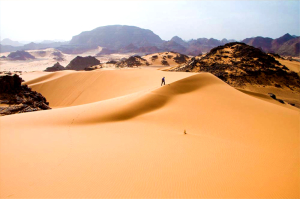
Although the contribution of Sub-Saharan Africa’s countries to global temperature increases is negligible (they are responsible for only 3-4% of global greenhouse gas emissions), they are ultimately the most vulnerable to climate change in terms of their ability to adapt. In this case, the primary victims are going to be the poorest countries of the African continent: those located south of the Sahara Desert.
The situation is aggravated by the fact that the region’s development is mainly based on the industries that are heavily dependent on climate, especially on agriculture, which will face such problems as water shortages and a decrease in available farmland due to the loss of fertile soil and desertification. All this will affect the worsening food situation in conditions of extremely unproductive farming and exacerbate the problems of poverty.
With every 1% increase in temperature, farmland yields will decrease by a factor of 10-30%. In South Africa, this figure will amount to 30-50%. And this is despite the fact that, by 2030-2050, agricultural demand is expected to increase by 70-100% in comparison to current levels and given that population growth and urbanization are factored in.
The ability for agriculture to adapt to increasing periods of drought, despite local residents’ thorough experience in dealing with negative climate conditions, will be hampered by intensifying water problems.
The complexity of the situation lies in the fact that agriculture in Sub-Saharan countries depends on rainfall for 75% of its water. A 10% decrease thereof would undermine the economic base of rural residents, weakening their income and increasing the number of poor from 400 to 600 million people by 2015, and those in situations of starvation to 240 million people by 2080.
Climate change during a time of dependence of African countries on imported goods and the rising prices of such goods on the global market as well as the reduction of local food security will destabilize the economic base of fragile governments with accordant political instability following in the region. Efforts to control access to resources will obviously have a basis in politics. Based on current figures, climate change will cause the number of armed conflicts from now until 2030 to increase by 54% as compared to the period of 1980-2000. One should not exclude the possibility of outbreaks of “water wars” for the control of water resources in cases of shortages and depletion of stores. The fact of the matter is that fifty rivers, the majority of which are located south of the Sahara, cross international boundaries.
Increases in conflicts in general will also be contributed to by mass migrations of people who will become ecological refugees due to the expansion of the desert around the Sahara, the flooding of river valleys and coastal regions due to rising sea levels and resultant inundation. As a result of the flooding of coastal territories, the number of affected people will increase from 1 million in 1990 to 70 million in 2080. Ultimately, more than a quarter of Africa’s population lives within 100 km of the coast, where six out of the ten largest cities on the continent are located.
There are real fears that climate change will be able to cancel out the positive shifts in the development of the countries of the continent that have begun to take shape, to strengthen existing conflicts and to undermine the socio-economic and political frameworks of fragile states.
Natalia Rogozhina, Doctor of Political Science, Leading Researcher at IMEMO RAN, exclusively for the online magazine “New Eastern Outlook”.
